Form 1 Research Goals, Recruiting Requirements, Research Questi
Generic Clearance for Questionnaire Pretesting Research
Attachment A - ACS Cognitive Testing Research Goals, Recruiting Requirements, Questions, Modified Mail Materials_FINAL
2020 ACS Respondent Burden Testing
OMB: 0607-0725
Attachment A: American Community Survey (ACS) Cognitive Testing of American Community Survey Recipients during a Decennial Year
Research Goals, Recruiting Requirements, Research Questions and 2020 Modified Materials
November 21, 2019
Introduction
Research Objective: This round of cognitive testing will examine the experiences of 48 recipients of the American Community Survey (ACS) during the 2020 Census. This research will assess recipients’ (1) reaction to receiving both the ACS and the 2020 Census, and (2) impression of ACS mail materials with added messaging communicating that households need to complete both the ACS and the Decennial Census.
Background: Households in sample for the ACS in 2020 are legally required to complete both the ACS and the Decennial Census. Receiving two sets of mailings in one calendar year may be confusing to respondents. Also, being asked to complete both the Decennial Census and the ACS may be burdensome and may decrease the rate of self-response.
During the 2010 Decennial Census, ACS response rates were higher than usual in the first few months of the year but were lower than usual in the spring and summer months (see Chesnut and Davis 2011, Baumgardner 2013). The increase early in the year may have occurred because the decennial census communications campaign brought attention to the U.S. Census Bureau. The decrease later in the year may be because recipients thought the ACS was the Decennial Census and disregarded the ACS questionnaire.
To mitigate these issues in 2020, a set of modified mail materials have been developed with language that directly addresses the difference between the ACS and the 2020 Decennial Census. These materials will be used during the main response period for the 2020 Census, March through September. The 2020 ACS language modifications are based on an evaluation conducted by the Census Bureau in 2010 (see Chesnut and Davis 2011). Frequently Asked Questions (FAQs) that address recipients’ questions on the difference between the ACS and the 2020 Census have been added to mail materials as well.
Recruitment and Interviews
Recruitment Requirements:
Participants have to be in the ACS sample for March, April or May panels.
One-third of participants must be in the March Panel.
One-third of participants must be in the April Panel.
One-third of participants must be in the May Panel.
Participants must have received the ACS and the 2020 Decennial Census.
Participant’s response to either or both requests are not required.
At least six participants must live in a rural area.
The Census Bureau will define the areas and provide cases to Westat.
Participants must handle the mail for their household, either alone or in combination with other household members.
At least 10 participants should have less than a Bachelor’s degree.
Participants should be diverse on demographic characteristics such as:
Race/ethnicity
Age
Sex
Household size
Participants must not have participated in a Westat cognitive testing project in the past six months.
Recruitment Modules:
Table 1. Recruitment modules per interview and total number of participants
-
# of Modules
Interviews per Module
Total # of Participants
4
12
5
Interview Timeline:
Table 2. Recruitment and interview schedule by panel month and response type
-
Panel
Response type
Recruitment begins
Interviewing occurs
March
Self-Response households
April
April - May
Non-Response households
May
May - June
April
Self-Response households
May
May - June
Non-Response households
June
June - July
May
Self-Response households
June
June - July
Non-Response households
July
July- August
Self-respondents should be interviewed as soon as possible after they respond (Non-respondents prior to CAPI).
Non-respondents should not be interviewed until they have been exposed to the full ACS and 2020 Census mailing strategies.
The Census Bureau will provide Westat with a list of respondents and non-respondents.
Research Questions:
What are participants’ general engagement with civic activities or community involvement (e.g. voting, Parent Teacher Association, Homeowner Association, volunteer work, other political activities)?
How and how often is mail handled in participants’ households?
What did participants remember about the ACS’s and the 2020 Census’ mailings and questionnaire?
Did participants notice that they were asked to complete two different questionnaires?
How did participants know that they were being asked to complete two different questionnaires?
What did participants think were the differences between the ACS and the 2020 Census?
What aspects of the mailings, if any, helped participants understand that the ACS is different from the 2020 Census?
How did participants decide to answer either or both questionnaires?
Were participants aware that their response was mandatory (to either or both)?
What aspects of the mailings influenced participants’ decision to participate (to either or both)?
How did participants feel when they received the ACS and the 2020 Census? What thought processes did participants go through when they received the ACS and 2020 Census?
What were participants’ general reaction to the mailings?
What were participants’ perceptions of the usefulness of the 2020 FAQs?
Did participants notice the FAQs on the mailings?
Did it answer questions that they had?
Did it help differentiate the ACS from the 2020 Census?
What action, if any, did participants take to get additional information about the ACS or 2020 Census?
Appendix A – Interaction between ACS and 2020 Census
ACS Panel |
Census Cohort |
Contact 1 |
Contact 2 |
Contact 3 |
Contact 4 |
Contact 5 |
Contact 6 |
Contact 7 |
Contact 8 |
Contact 9 |
Contact 10 |
March |
Internet Push Cohort 1&2 |
March
2 |
March
9 |
March
12 |
March
16 |
March
23 |
March
26 |
March
26 |
April
8 |
April
17 |
April
20 |
March |
Internet Push Cohort 3&4 |
March
2 |
March
9 |
March
19 |
March
23 |
March
23 |
March
26 |
April
2 |
April
15 |
April
17 |
April
27 |
March |
Internet Choice |
March
2 |
March
9 |
March
12 |
March
16 |
March
23 |
March
26 |
March
26 |
April
8 |
April
17 |
April
20 |
April |
Internet Push Cohort 1&2 |
March
12 |
March
16 |
March
26 |
March
30 |
April
6 |
April
8 |
April
20 |
April
20 |
April
23 |
May
15 |
April |
Internet Push Cohort 3&4 |
March
19 |
March
23 |
March
30 |
April
2 |
April
6 |
April
15 |
April
20 |
April
23 |
April
27 |
May
15 |
April |
Internet Choice |
March
12 |
March
16 |
March
26 |
March
30 |
April
6 |
April
8 |
April
20 |
April
20 |
April
23 |
May
15 |
May |
Internet Push Cohort 1&2 |
March
12 |
March
16 |
March
26 |
April
8 |
April
20 |
May
4 |
May
11 |
May
26 |
May
29 |
June
19 |
May |
Internet Push Cohort 3&4 |
March
19 |
March
23 |
April
2 |
April
15 |
April
27 |
May
4 |
May
11 |
May
26 |
May
29 |
June
19 |
May |
Internet Choice |
March
12 |
March
16 |
March
26 |
April
8 |
April
20 |
May
4 |
May
11 |
May
26 |
May
29 |
June
19 |
Appendix B – ACS 2020 Mail Materials
ACS 2020 Mail Materials with 2020 Census-specific language include:
Initial Mailing – Letter (front)
The second paragraph contains two sentences with 2020 Census-specific language.
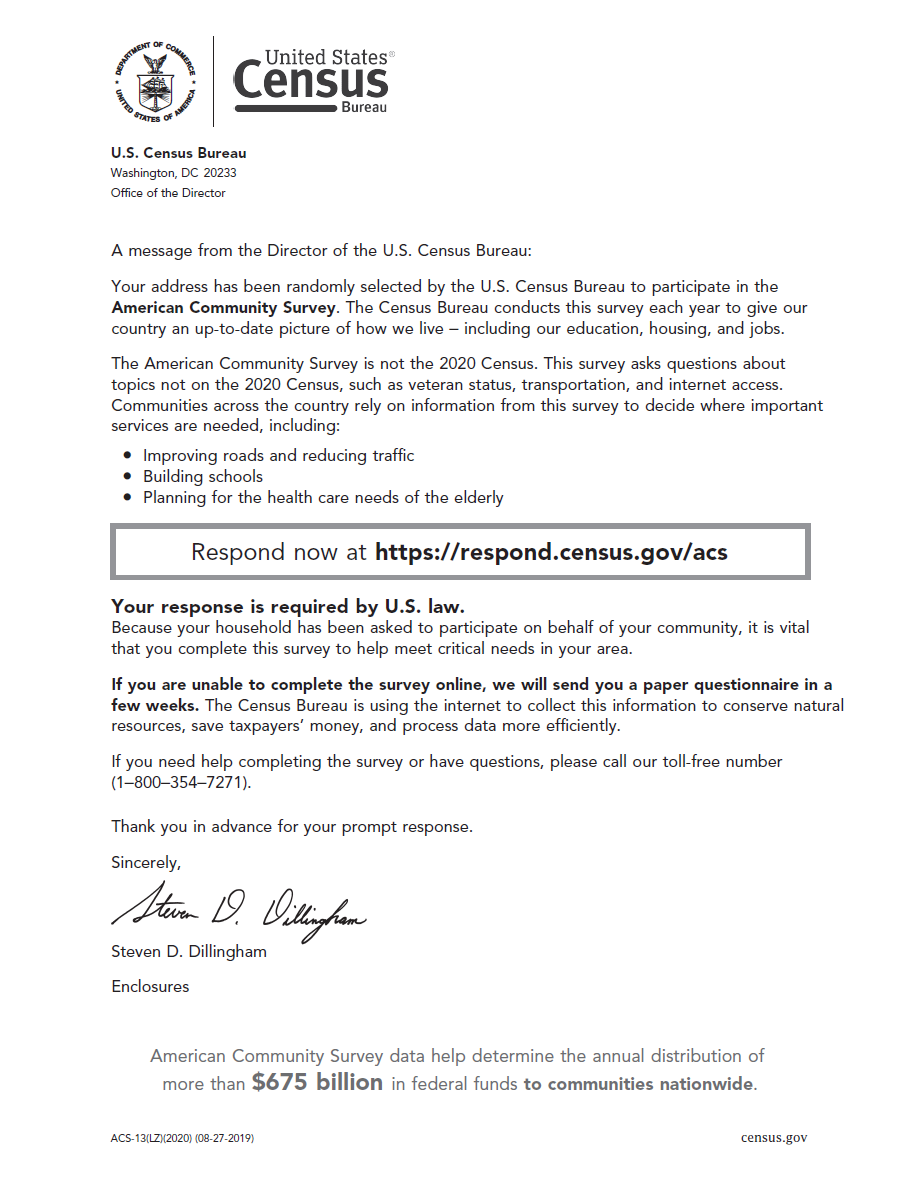 Initial
Mailing – Letter
(back)
Initial
Mailing – Letter
(back)
The first two FAQs discuss the 2020 Census.
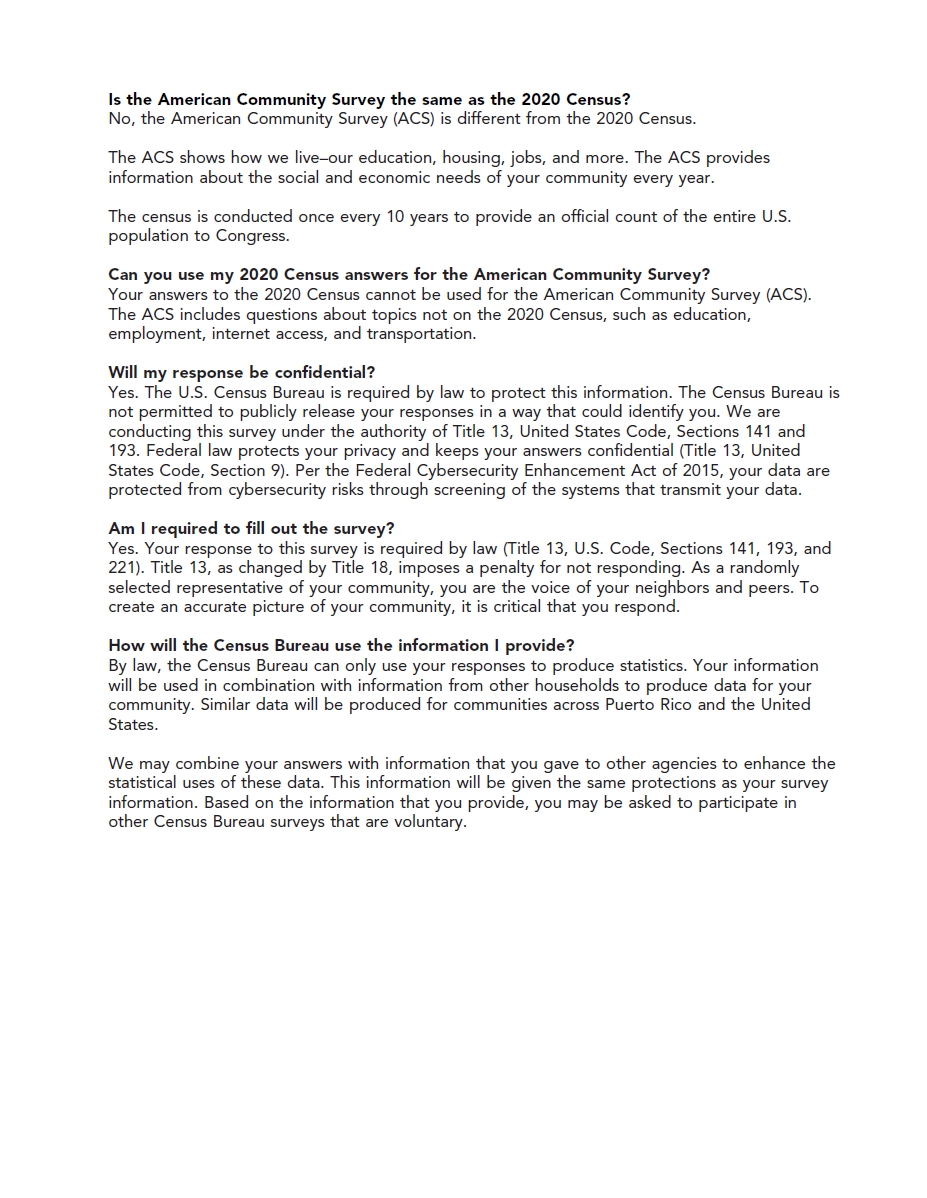
2nd Mailing – Pressure Seal Mailer (address side)
The address side of the pressure seal mailer mentions the American Community Survey.
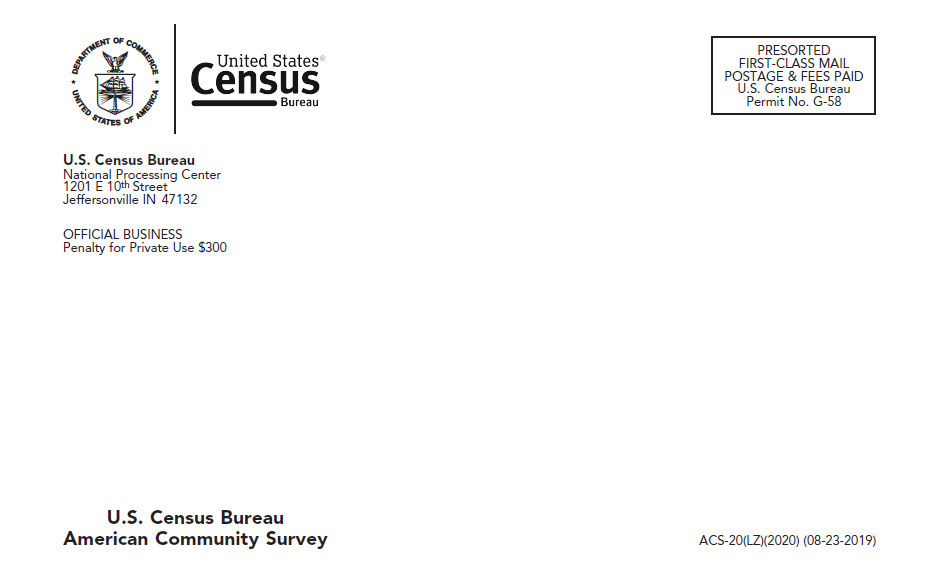
2nd Mailing – Pressure Seal Mailer (letter side)
2020 Census-specific language is in the second paragraph.
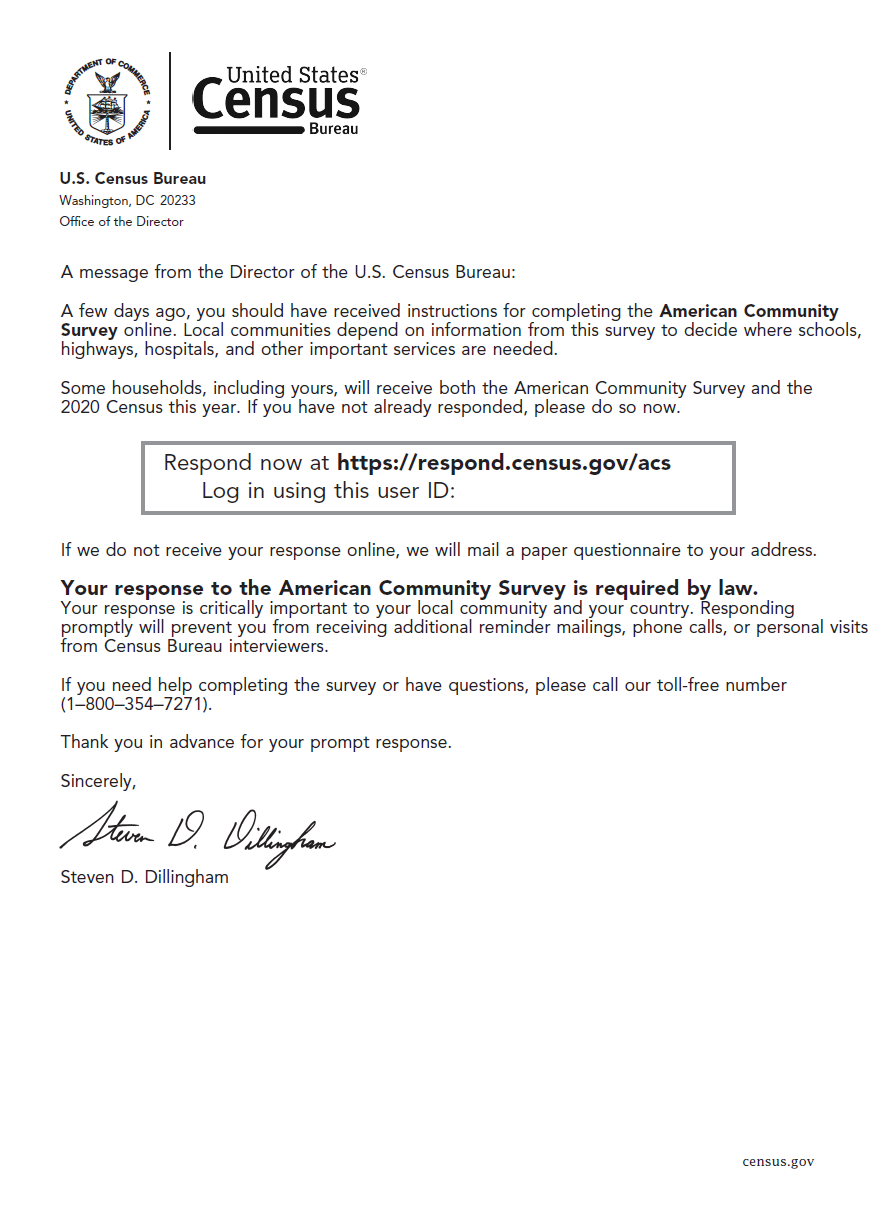
3rd Mailing – Letter (front)
The paragraph below the response options contains 2020 Census-specific language.
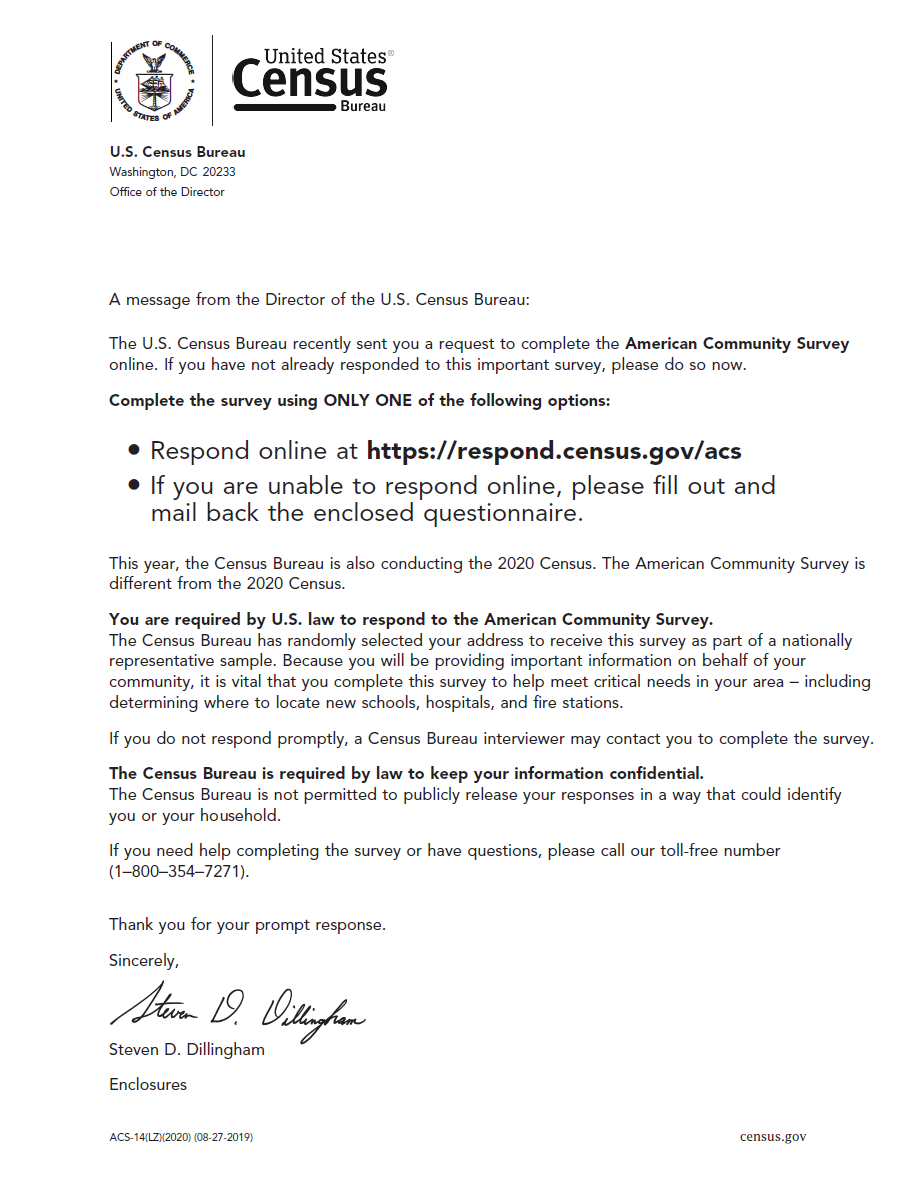
3rd Mailing – Letter (back)
The first two FAQs contain 2020 Census-specific language.
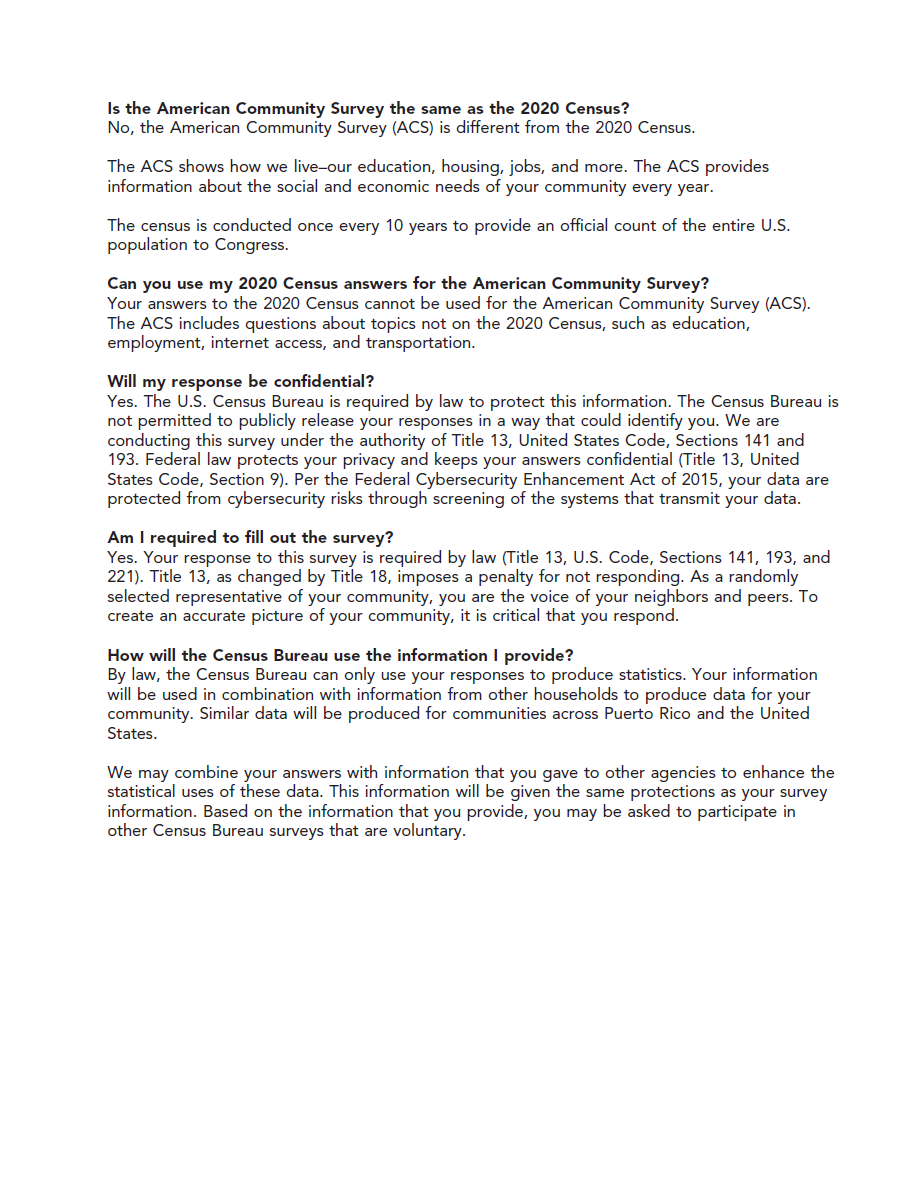
| File Type | application/vnd.openxmlformats-officedocument.wordprocessingml.document |
| Author | Daphney Dupervil (CENSUS/ACSO FED) |
| File Modified | 0000-00-00 |
| File Created | 2021-01-14 |
© 2026 OMB.report | Privacy Policy